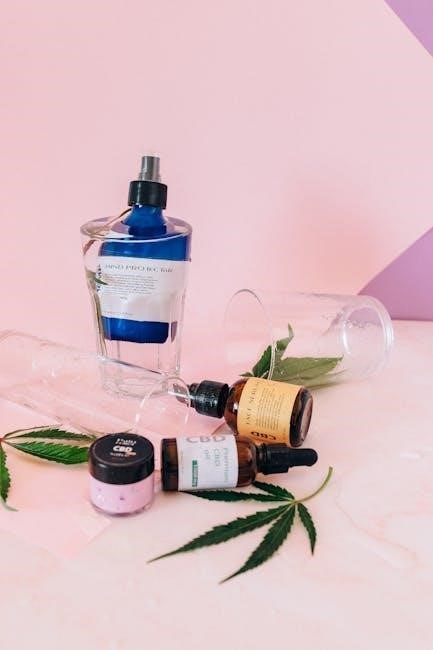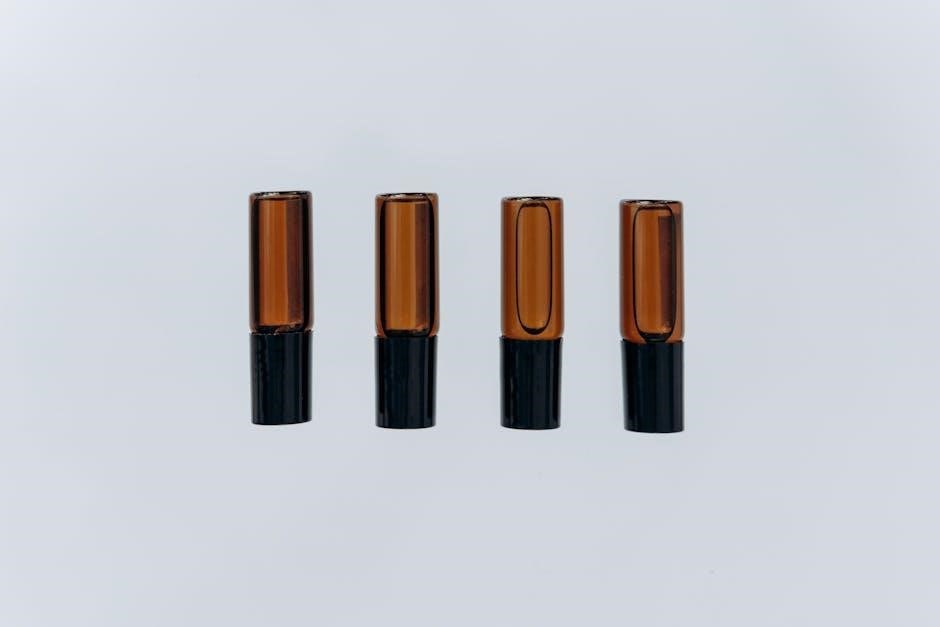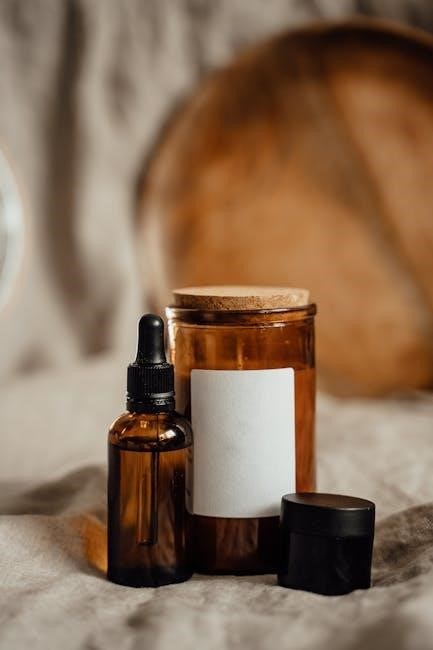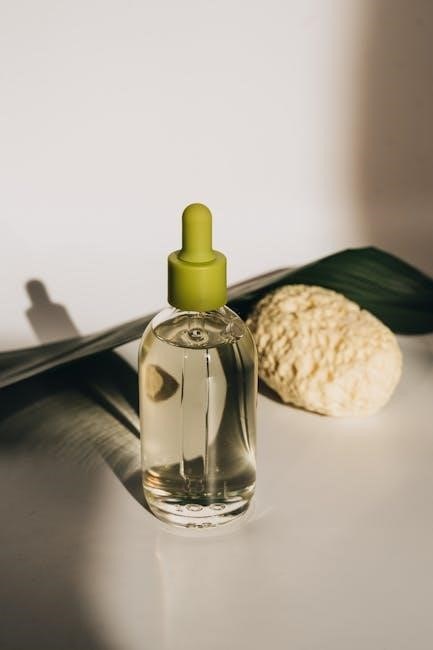Essential oils are concentrated plant extracts offering diverse benefits, from stress relief to skin health. Popular oils like lavender, peppermint, and frankincense are widely used for their versatility.
1.1 What Are Essential Oils?
Essential oils are highly concentrated plant extracts, typically obtained through steam distillation or cold pressing. They capture the unique aromatic and therapeutic properties of plants, offering versatile applications in aromatherapy, skincare, and natural remedies. These oils are complex mixtures of organic compounds, often used for their fragrance, health benefits, and emotional well-being. Unlike fatty oils, essential oils are not greasy and evaporate quickly. They are potent, so dilution with carrier oils is often recommended for safe use. Derived from flowers, leaves, roots, or citrus peels, essential oils are valued for their ability to promote physical and mental well-being.
1.2 Brief History of Essential Oils
Essential oils have been used for thousands of years, dating back to ancient civilizations. The Egyptians utilized them for mummification and perfumes, while the Chinese employed them for medicinal purposes. The Greeks and Romans later adopted these oils for therapeutic and spiritual practices. In the Middle Ages, essential oils were valued for their antiseptic properties and use in herbal medicine. The modern era saw a revival in the 20th century with the rise of aromatherapy, popularized by researchers like René-Maurice Gattefossé. Today, essential oils are integral to holistic health, skincare, and natural remedies, reflecting their enduring popularity and versatility.
1.3 Importance of Essential Oils in Modern Life
Essential oils play a vital role in modern life, offering natural solutions for health, wellness, and sustainability. They are used for their therapeutic benefits, enhancing mental well-being, improving sleep quality, and boosting immunity. In skincare, essential oils provide natural alternatives for acne, moisturizing, and anti-aging. As chemical-free options, they are increasingly popular in household cleaning and personal care products. Additionally, essential oils aid in emotional well-being, reducing anxiety and stress. Their versatility and effectiveness make them a preferred choice in today’s fast-paced, health-conscious world, promoting a holistic approach to everyday life.

Popular Essential Oils and Their Uses
Essential oils like lavender, peppermint, and frankincense are widely recognized for their versatility and therapeutic benefits, offering natural solutions for relaxation, energy, and overall well-being.
2.1 Top 10 Essential Oils for Daily Use
The top 10 essential oils for daily use include lavender, peppermint, frankincense, tea tree, eucalyptus, rosemary, orange, geranium, chamomile, and bergamot. Lavender is renowned for stress relief and sleep enhancement, while peppermint boosts energy and aids digestion. Frankincense is valued for its anti-aging and anti-inflammatory properties. Tea tree oil is a potent antimicrobial agent, ideal for skincare. Eucalyptus is commonly used for respiratory issues, and rosemary enhances cognitive function. Orange oil uplifts mood, geranium balances hormones, chamomile soothes anxiety, and bergamot reduces stress. These oils offer versatile solutions for health, wellness, and daily routines.
2.2 Lavender Oil: Benefits and Applications
Lavender oil is celebrated for its calming properties, promoting relaxation and improving sleep quality. It is widely used in aromatherapy to alleviate stress and anxiety. Known for its gentle nature, lavender oil is effective in skincare, soothing acne, and calming sensitive skin. It also aids in wound healing due to its antiseptic properties. Additionally, lavender oil can act as a natural insect repellent and is often added to bathwater for a soothing experience. Its versatility makes it a staple in both therapeutic and everyday applications, enhancing overall well-being and mental clarity.
2.3 Peppermint Oil: Uses for Energy and Digestion
Peppermint oil is renowned for its invigorating properties, offering a natural boost to energy levels and mental clarity. It is highly effective in alleviating digestive issues, such as indigestion and bloating, due to its cooling and anti-inflammatory effects. Often used in aromatherapy, peppermint oil can be diffused to enhance focus and uplift the mood. It can also be applied topically to relieve muscle tension or added to herbal teas for digestive comfort. Its refreshing aroma and versatile benefits make it a popular choice for both physical and mental well-being, providing quick relief and a sense of vitality.
2.4 Tea Tree Oil: Antimicrobial Properties
Tea tree oil, derived from Melaleuca alternifolia, is celebrated for its potent antimicrobial and antifungal properties, making it a natural remedy for various health and skincare issues. It is commonly used to treat acne, minor wounds, and fungal infections due to its ability to combat bacteria and promote healing. Tea tree oil is also effective in reducing inflammation and soothes irritated skin. Its versatility extends to household use, where it can be added to cleaning products for its disinfectant qualities. This oil is a staple in natural medicine, providing a safe and effective alternative to harsh chemicals for maintaining health and hygiene.
2.5 Frankincense Oil: Anti-Aging and Stress Relief
Frankincense oil, derived from the resin of the Boswellia tree, is renowned for its anti-aging and stress-relieving properties. It reduces inflammation, promotes skin elasticity, and minimizes wrinkles, making it a popular choice in skincare routines. Additionally, frankincense oil is known to alleviate anxiety and stress by creating a calming effect when used in aromatherapy. Its grounding aroma helps improve mental clarity and emotional balance. This versatile oil is often used in meditation practices and can be added to topical blends to enhance skin health and reduce the appearance of scars and fine lines.

Essential Oil Uses by Category
Essential oils are versatile, offering benefits across various categories like aromatherapy for mental well-being, skincare for acne and aging, and household cleaning as natural alternatives to harsh chemicals.
3.1 Aromatherapy: Enhancing Mental Well-Being
Aromatherapy harnesses the power of essential oils to enhance mental well-being. Oils like lavender and bergamot promote relaxation, reducing stress and anxiety. Peppermint oil boosts energy and focus, while frankincense supports emotional balance. Diffusing these oils creates a calming environment, improving mood and cognitive function. Regular use can lead to long-term emotional resilience and overall mental health benefits, making aromatherapy a natural and effective practice for maintaining a healthy mindset in daily life.
3.2 Skincare: Oils for Acne, Moisturizing, and Anti-Aging
Essential oils offer natural solutions for various skincare concerns. Tea tree oil’s antimicrobial properties combat acne, while lavender oil soothes irritation and promotes healing. Jojoba and argan oils are excellent for moisturizing, providing hydration without clogging pores. Frankincense oil reduces fine lines and wrinkles, aiding anti-aging efforts. Rosemary oil improves circulation, enhancing skin tone. By incorporating these oils into skincare routines, individuals can address specific needs, from acne treatment to maintaining youthful, healthy-looking skin. Always dilute with a carrier oil for safe application.
3.3 Household Cleaning: Natural Alternatives to Chemicals
Essential oils provide eco-friendly alternatives to harsh chemicals in household cleaning. Lemon oil acts as a natural disinfectant, while tea tree oil offers antifungal and antibacterial properties. Eucalyptus oil refreshes and deodorizes, making it ideal for eliminating odors. Mix a few drops of these oils with vinegar or baking soda for effective all-purpose cleaners. These solutions are non-toxic and biodegradable, offering a safer option for families and pets. By incorporating essential oils, you can create a cleaner, greener home environment without compromising on hygiene or fragrance.
3.4 Pain Relief: Oils for Muscle and Joint Pain
Essential oils like arnica, eucalyptus, and peppermint are renowned for their pain-relieving properties. Arnica oil reduces inflammation, while eucalyptus cools muscle tension. Peppermint oil’s menthol content provides a soothing, numbing effect. Frankincense and wintergreen oils also offer anti-inflammatory benefits, easing joint pain. These oils can be applied topically, often diluted with a carrier oil, or inhaled for relief. They provide a natural alternative to synthetic painkillers, promoting comfort without harmful side effects. Regular use can significantly alleviate muscle and joint discomfort, enhancing overall well-being naturally.
3.5 Emotional Well-Being: Oils for Anxiety and Stress
Essential oils like lavender, bergamot, and frankincense are widely used to support emotional well-being. Lavender oil calms the mind, reducing anxiety and stress. Bergamot oil uplifts spirits, combating depression and anxiety. Frankincense promotes relaxation and emotional balance. Ylang-ylang oil soothes nervous tension, while sandalwood oil grounds the mind, easing stress. These oils can be diffused, inhaled directly, or applied topically with a carrier oil. Regular use helps alleviate emotional distress, fostering peace and mental clarity. They offer a natural, holistic approach to managing anxiety and stress effectively.

Safety and Precautions
Essential oils require cautious use to avoid adverse reactions. Always dilute with carrier oils, patch test, and consult professionals, especially during pregnancy or for pets.
4.1 Essential Oil Safety Guidelines
Essential oils are potent, so proper usage is crucial. Always dilute with carrier oils to avoid skin irritation; Perform a patch test before widespread use. Keep oils away from eyes and sensitive areas. Store in cool, dark places, out of children’s reach. Consult a healthcare professional before using oils during pregnancy or for medical conditions. Ensure high-quality, pure oils are selected. Follow recommended dilution ratios and usage amounts. Be aware of potential allergies or sensitivities. Educating yourself on safe practices ensures maximum benefits and minimizes risks. Safe usage enhances well-being and prevents adverse reactions.
4.2 Allergies and Sensitivities: What to Watch Out For
Allergies and sensitivities to essential oils are common due to their potency. Always conduct a patch test before using new oils. Dilute oils with carrier oils to minimize irritation. Certain oils, like tea tree and lavender, are known allergens. Watch for signs of sensitivity, such as redness, itching, or rashes. If irritation occurs, discontinue use and seek medical advice. Some individuals, especially those with eczema or fragrance allergies, may be more prone to reactions. Proper precautions ensure safe and effective use of essential oils for all individuals.
4.3 Using Essential Oils During Pregnancy
Using essential oils during pregnancy requires caution due to their potent nature. Always consult a healthcare provider before use. Some oils, like lavender and chamomile, may be safe for relaxation, while others, such as clary sage and rose, should be avoided, especially in the first trimester. Dilute oils properly and use them in moderation. Avoid ingesting essential oils unless directed by a medical professional. Certain oils can stimulate the uterus or cause hormonal changes, posing risks to the pregnancy. Prioritize safety and seek professional advice to ensure well-being for both mother and baby.
4.4 Essential Oils and Pets: Safety Considerations
Essential oils can be toxic to pets due to their concentrated nature. Always consult a vet before use; Oils like tea tree, eucalyptus, and peppermint are particularly harmful, causing symptoms such as vomiting or seizures in animals. Keep essential oils out of reach to prevent accidental ingestion. If unsure, opt for natural, pet-safe alternatives like coconut oil or aloe vera. Proper storage and caution are crucial to ensure your pet’s safety. Never apply or diffuse oils near pets without professional guidance to avoid potential harm.

DIY Recipes Using Essential Oils
Explore homemade blends for relaxation, natural cleaning products, and bath and body essentials. Essential oils offer versatility in creating personalized products for wellness and everyday use.
5.1 Homemade Blends for Relaxation
Essential oils like lavender and chamomile are perfect for creating calming blends. Combine 5 drops of lavender with 3 drops of bergamot for a soothing atmosphere. Add 2 drops of frankincense to enhance relaxation. Mix these with a carrier oil like jojoba for skin-safe application. Diffuse the blend or incorporate it into bath salts for a spa-like experience. These blends promote mental calmness and reduce stress, ideal for unwinding after a long day. Experiment with different ratios to find your perfect mix for relaxation and tranquility.
5.2 Natural Cleaning Products with Essential Oils
Essential oils are excellent for creating natural cleaning products. Tea tree oil, known for its antimicrobial properties, can be mixed with vinegar and water for an all-purpose cleaner. Lemon oil adds a refreshing scent and helps disinfect surfaces. Eucalyptus oil is great for eliminating odors and can be used in bathroom cleaners. Combine 10 drops of tea tree oil, 10 drops of lemon oil, and 1 cup of white vinegar with 1 liter of water for an effective solution. These blends are eco-friendly and chemical-free, perfect for a safe and clean home environment.
5.3 Essential Oil-Based Bath and Body Products
Essential oils can enhance bath and body products, offering natural benefits for skin and relaxation. Lavender oil is ideal for bath salts, promoting calmness and soothing skin irritations. Chamomile oil is perfect for sensitive skin, reducing inflammation and moisturizing. Frankincense oil is often used in anti-aging products, improving skin elasticity. For a simple bath, mix 1 cup Epsom salt, 1/2 cup baking soda, and 10 drops of your preferred essential oil. These blends create luxurious, chemical-free products tailored to your needs, ensuring a rejuvenating experience while maintaining skin health naturally.
Health Benefits of Essential Oils
Essential oils promote well-being by improving sleep, boosting immunity, and reducing inflammation. They enhance mental clarity and emotional balance, offering natural solutions for overall health.
6.1 Improving Sleep Quality
Essential oils can significantly enhance sleep quality by promoting relaxation and reducing stress. Lavender oil, known for its calming properties, is often used to create a soothing bedtime atmosphere. Frankincense oil also aids in relaxation, helping to quiet the mind and body. Diffusing these oils before sleep or incorporating them into a calming bath routine can lead to deeper, more restful sleep. Additionally, blending oils like chamomile and bergamot can create a tranquil sleep environment, improving overall sleep hygiene and mental well-being. Regular use can help establish a consistent sleep pattern.
6.2 Boosting the Immune System
Essential oils can play a vital role in enhancing immune function by providing antimicrobial and anti-inflammatory properties. Oils like eucalyptus, tea tree, and frankincense are known for their ability to combat pathogens and support respiratory health. Diffusing these oils can help purify the air, reducing the presence of harmful microorganisms. Additionally, oils such as oregano and thyme have potent antimicrobial effects, which can help protect against infections. Regular use of these oils in aromatherapy or topical applications can contribute to a stronger immune system, promoting overall well-being and resilience.
6.3 Reducing Inflammation
Essential oils are renowned for their anti-inflammatory properties, offering natural relief from swelling and pain. Frankincense oil, rich in boswellic acids, is particularly effective at reducing inflammation and improving joint health. Turmeric oil, with its curcumin content, is another potent option for combating inflammation. Ginger oil also provides warming, anti-inflammatory benefits, making it ideal for muscle and joint discomfort. These oils can be used topically, in aromatherapy, or blended into massage oils to enhance their therapeutic effects. Regular use can significantly alleviate inflammation, promoting comfort and well-being. Always dilute with a carrier oil for safe application.
6.4 Enhancing Cognitive Function
Essential oils can significantly enhance cognitive function, improving focus, memory, and mental clarity. Peppermint oil, known for its invigorating properties, boosts alertness and concentration, making it ideal for studying or work. Rosemary oil is another standout, as it contains compounds that improve memory and enhance mental performance. Frankincense oil also supports brain health by reducing inflammation and promoting neural function. These oils can be diffused in the air or applied topically, diluted with a carrier oil, to create an environment conducive to mental acuity and productivity, naturally improving cognitive abilities. Regular use fosters a sharper, more focused mind.

Essential Oil Extraction Methods
Essential oils are extracted through methods like steam distillation, cold pressing, and solvent extraction. Each technique ensures high-quality oils, preserving their natural potency and aroma effectively.
7.1 Steam Distillation
Steam distillation is the most common method for extracting essential oils. It involves boiling plant material with high-pressure steam, causing the oils to be released. The steam carrying the oils is then cooled and condensed, separating the oil from the water. This method is highly effective for preserving the delicate compounds of plants. It’s a chemical-free process, making it ideal for producing high-quality oils. Steam distillation is widely used for citrus, floral, and herbal oils, ensuring purity and potency;
7.2 Cold Pressing
Cold pressing is a mechanical extraction method primarily used for citrus essential oils. The process involves crushing or squeezing the rind of citrus fruits under high pressure to release the oil. Unlike steam distillation, cold pressing avoids high temperatures, preserving the oil’s delicate compounds. This method is ideal for citrus fruits like oranges, lemons, and grapefruits. The resulting oil is known for its fresh, vibrant aroma and high quality. Cold pressing is a traditional and effective technique that ensures the oil retains its natural properties and fragrance. It is widely regarded for its purity and shelf life.
7.3 Solvent Extraction
Solvent extraction is a chemical-based method to obtain essential oils from delicate plant materials. It involves using solvents like ethanol or hexane to dissolve the plant’s aromatic compounds. This process is often used for flowers such as roses and jasmine, which are too fragile for steam distillation. The solvent is later removed, leaving behind a fragrant oil. While effective for certain plants, solvent extraction may result in oils with less natural character due to residual solvent traces. This method is less common in high-quality essential oils but is valued for specific floral scents.
Storage and Shelf Life
Proper storage is essential to maintain the quality of essential oils. Store them in dark glass bottles, away from heat and light, to preserve potency. Refrigeration can extend shelf life, but check labels for specific instructions. Always ensure tight seals to prevent oxidation and contamination. Proper care ensures oils remain effective for aromatic and therapeutic use.
8.1 How to Store Essential Oils Properly
Essential oils should be stored in dark glass bottles to protect them from UV light, which can degrade their quality. Keep them in a cool, dry place away from direct sunlight and heat sources. Tight-fitting lids are crucial to prevent oxidation and contamination. Refrigeration can extend the shelf life of certain oils, but always check the label for specific instructions. Avoid storing oils near children or pets and ensure they are tightly sealed after each use. Proper storage preserves the potency and aroma of essential oils, ensuring they remain effective for therapeutic and aromatic use.
8.2 Factors Affecting Shelf Life
The shelf life of essential oils is influenced by storage conditions, light exposure, temperature fluctuations, and oxidation. Oils high in terpenes, like frankincense, are more prone to oxidation, which can degrade their quality. Heat and light accelerate chemical changes, reducing potency and aroma. Proper storage in dark, airtight bottles and cool environments slows degradation. Additionally, the quality of the oil at purchase plays a significant role; pure, unadulterated oils generally last longer. Knowing these factors helps maximize the longevity and effectiveness of your essential oil collection. Regularly checking for changes in smell or consistency is advisable.
Essential Oils for Specific Needs
Essential oils cater to various specific needs, from seasonal allergies to hair care. Oils like eucalyptus and peppermint offer natural solutions for respiratory issues and mental clarity.
9;1 Oils for Seasonal Allergies
Essential oils like eucalyptus, peppermint, and lavender are beneficial for seasonal allergies. Eucalyptus oil helps reduce congestion, while peppermint cools nasal passages. Lavender soothes irritation. Tea tree oil’s antimicrobial properties combat allergens. These oils can be diffused for immediate relief or applied topically when diluted. Regular use may alleviate symptoms like sneezing and sinus pressure. Always dilute with a carrier oil and consult a healthcare professional before use.
9.2 Oils for Hair Care
Essential oils offer natural solutions for various hair concerns. Lavender oil promotes scalp health and reduces dandruff, while rosemary oil stimulates hair growth and improves circulation. Tea tree oil’s antimicrobial properties combat dandruff and scalp infections. Geranium oil balances oil production, and cedarwood oil strengthens hair follicles. Chamomile oil soothes an itchy scalp and adds shine. These oils can be added to shampoos, conditioners, or used in pre-shampoo treatments. Regular use may enhance hair strength, reduce frizz, and leave hair smelling fresh. Always dilute with a carrier oil for safe application.
9.3 Oils for Insect Repellent
Essential oils provide natural alternatives to chemical-based insect repellents. Lemongrass, citronella, and peppermint oils are known for their strong scents that repel mosquitoes and other insects. Cedarwood oil deters ticks and fleas, while eucalyptus oil repels flies and mosquitoes. Lavender oil, though calming to humans, can repel moths and mosquitoes. These oils can be diluted with carrier oils like coconut or jojoba and applied to skin or clothing. Blending multiple oils may enhance repellent effects; Always patch test for sensitivity before widespread use.
Essential oils offer natural solutions for health, wellness, and daily life. Their versatility in aromatherapy, skincare, and household uses makes them invaluable. Explore further to discover their full potential.
10.1 Final Thoughts on Essential Oils
Essential oils are a natural and versatile solution for enhancing health, wellness, and daily life. From aromatherapy to skincare, their benefits are vast and scientifically supported. Always prioritize safety, dilution, and quality when using these potent extracts. Whether for relaxation, energy, or household cleaning, essential oils offer a holistic approach to modern challenges. With proper knowledge and precautions, they can be a valuable addition to your lifestyle, fostering overall well-being and self-care. Embrace their potential responsibly and explore further to unlock their full benefits.
10.2 Encouragement to Explore Further
Essential oils offer endless possibilities for enhancing your lifestyle. With a wealth of resources available, from guides to DIY recipes, exploring further can empower you to maximize their benefits. Whether you’re interested in natural health, skincare, or household cleaning, there’s always more to discover. Experiment with different blends, learn about extraction methods, and stay informed about safety guidelines. The world of essential oils is vast and rewarding, so keep learning, experimenting, and embracing their natural potential to improve your well-being and daily life.